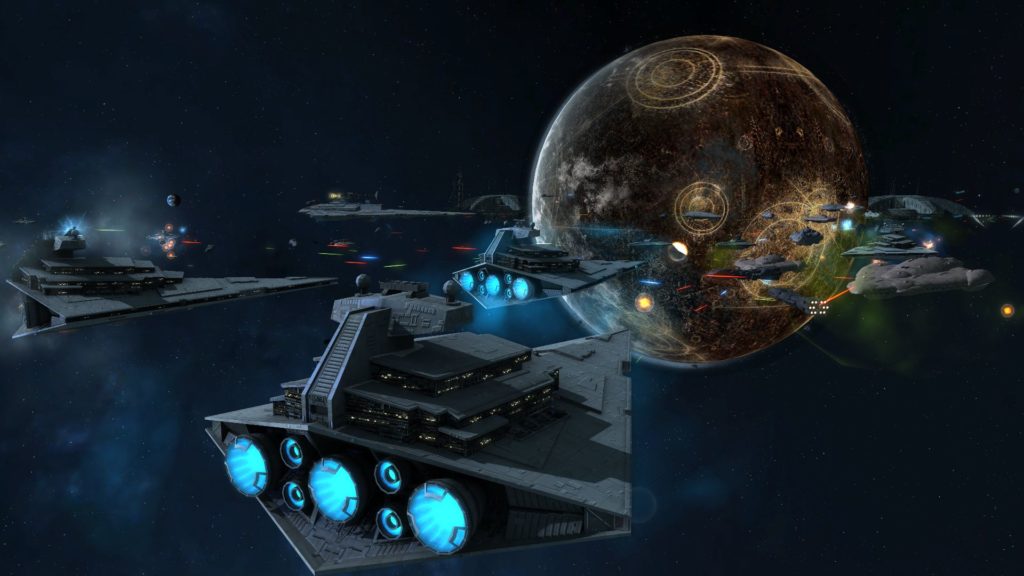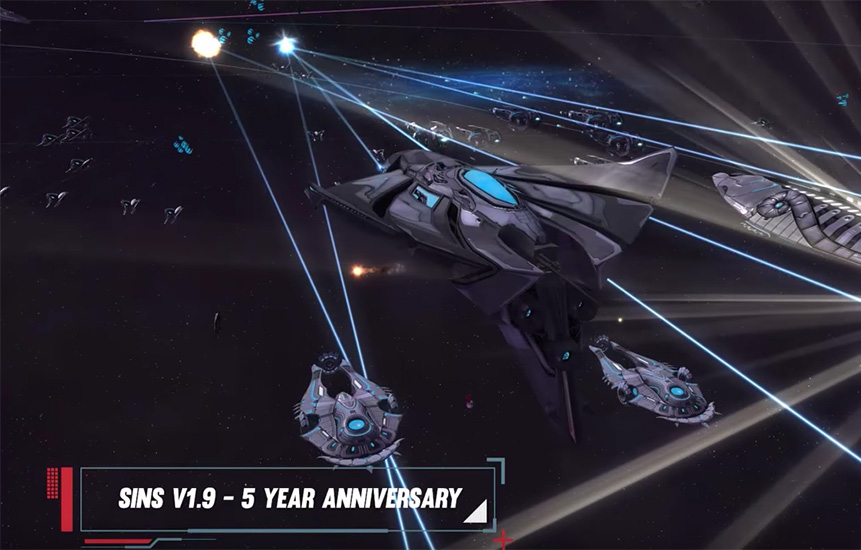When the first Sins of a Solar Empire game launched in 2008, it was regarded by many as a creative breakthrough in gameplay. The space empire strategy title combined elements from turn-based games such as Civilization and Master of Orion with real-time action, making for faster pacing in an expansive 3D galaxy. That original game established a reputation for Ironclad games, which followed-up with Sins of a Solar Empire: Rebellion in 2012, growing the concept’s size and scope.
Despite hitting its five-year anniversary recently, support for Rebellion continues and the most recent premium DLC expansion, Outlaw Sectors, launched last summer. Digital sales remain strong on Steam, and the game has a thriving community of players and modders. Ironclad helped to mark the anniversary by releasing a “modernization update” for Rebellion, which improves the game’s graphical quality to support today’s powerful computer systems.
Blair Fraser, producer, co-owner and director at Ironclad Games spoke with AListDaily about engaging with a player community to keep a game going for half a decade and more.
How are you celebrating the five-year anniversary?
With a lot of big changes. One of the things I’ve always wanted to do was bring it up to speed with what a lot of computers are capable of now, and the community is always asking for different features and changes. I wanted to put it all into one package and say, “Look at this! Even after five years, we still have awesome new stuff coming, and it looks and runs better than it ever has before.”
Is the Rebellion community still growing?
Yes, amazingly enough. I certainly didn’t foresee it, but we still sell very well, and we still get a lot of community engagements. I get emails and private messages all the time telling me that the game is cool, that their friends still play it, and it would be nice to add this or that. There’s always a vibrancy to the community and engagement.
What is the key to engaging with an audience for half a decade, especially for a real-time 4X sci-fi strategy game?
Well, there certainly aren’t many of them, so we’ve got some default engagement there. But more than that—they wouldn’t stick around if the game was crap. To maintain it, we’re always adding new stuff and improving things. If you look at the five years of Rebellion and the ten years of the original Sins, we’ve constantly supported it through both free updates and decently priced DLC expansion that we release now and then.
Five years, in PC gaming terms, is an eternity. Why continue releasing updates and expansions instead of moving to a sequel?
If a product continues to do well, you want to continue to support it. That’s just a simple business thing for us. It still makes money, so we still put resources into it. Personally, I’m obsessed with perfection, responding to what the community is asking for, and fixing things that bug me. I do most of the work on this project on my own free time, and I enjoy doing it. We are going to release other projects at some point, and we want to be known as a company that puts the time and effort into continuing to support the games we work on. It’s not a waste because people are going to say the next thing is worth buying because Ironclad is backing it for as long as they possibly can.
Did you consider futureproofing the game for the next five years as you were putting together the modernization update?
Actually, it’s a mirror of what we were thinking in the early 2000s, when we were developing the technology, which would become the game that’s still selling now. We thought we were futureproof then, and boy were we wrong. But it was a different mindset because retail was still dominant, so our version of futureproofing was, “how long will the game last on the shelf at Walmart?” So, we looked about two or three years in advance, plus the game would be on the shelf for a few months, and then the game would never be heard of again. That was the typical life of a PC game prior to digital sales.

How else have digital sales impacted the life of the game?
The fact that you can buy it at all is a huge difference from the days of old because it got pulled off the shelf once it passed its sales threshold. Now it’s always available. Every day, I check the Steam reviews, the Steam forums, our Sins of a Solar Empire forums and reports from Facebook, and I can see people are still playing and what the feedback is. I can also see them feeding each other by recommending the game.
The mod community has been instrumental in extending the life of Rebellion. What is it like to constantly update a game that players are changing up?
I love it, and that’s kind of how I got into games in the first place—just messing around with stuff, pushing boundaries, and changing things to the ways I wanted. I like any form of creative play, whether it’s Legos, modding or painting. I know some people say, “Don’t screw around with my baby,” but I think that’s too restrictive. Look at what music has come through remixes. Look at any artform. I’d be crazy to put the hammer down.
So, what are the steps for the next five years?
I’m still going to support Rebellion and the original Sins in my spare time, but my normal work hours are dominated by other things. You’ll hear more about that within the next five years—hopefully a lot less than that, but I’m not promising anything [laughs].

